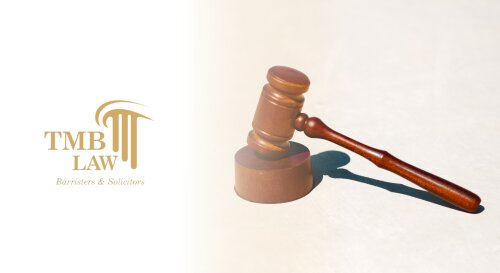Best Natural Resources Lawyers in Oshawa
Share your needs with us, get contacted by law firms.
Free. Takes 2 min.
List of the best lawyers in Oshawa, Canada
About Natural Resources Law in Oshawa, Canada
Natural Resources Law in Oshawa, Canada, is an integral part of environmental law that regulates the management and use of resources such as minerals, forests, water, and land. Oshawa, located in the province of Ontario, has a unique geographical makeup that includes lakes, rivers, and green spaces, all of which are subject to specific regulatory frameworks. The laws governing natural resources in Oshawa are designed to ensure the sustainable management and conservation of these resources while balancing economic development needs. Key areas include land use planning, environmental protection, water rights, and mineral resource development.
Why You May Need a Lawyer
There are several common situations where individuals or businesses might require legal assistance regarding natural resources in Oshawa. These include:
- Disputes over land or mineral rights
- Compliance with environmental regulations
- Development projects that impact natural landscapes
- Water usage or rights issues
- Permitting and licensing for resource extraction or land development
- Conservation easements and agreements
- Resolving conflicts with government agencies or other stakeholders
- Legal representation in environmental impact assessments
An experienced lawyer can provide guidance on navigating these complex legal landscapes, ensuring that all activities are compliant with current laws and regulations.
Local Laws Overview
The legal landscape surrounding natural resources in Oshawa is influenced by both federal and provincial laws. Key aspects include:
- Ontario’s Mining Act: Governs mineral exploration and extraction, ensuring sustainable development and environmental protection.
- Environmental Protection Act: Provides guidelines for environmental assessments, pollution control, and conservation efforts.
- Conservation Authorities Act: Facilitates the management of watersheds, protecting water quality and promoting responsible development around water bodies.
- Planning Act: Regulates land use planning and development, balancing growth with environmental preservation.
- Species at Risk Act: Offers protections for endangered species and their habitats, impacting land use and development activities.
Frequently Asked Questions
What constitutes a "natural resource" under Canadian law?
Natural resources are generally defined as resources such as water, minerals, forests, wildlife, and fish that occur in nature and are essential for the ecosystem.
What legal permits are required for mineral exploration in Oshawa?
You typically need exploration permits and approvals, which can be obtained from the Ministry of Energy, Northern Development and Mines. The specific permits required can vary based on the scope and location of the exploration.
How does Canadian law protect water resources?
Canadian law, particularly through provincial legislation like Ontario’s Clean Water Act, aims to protect source water and manage its use sustainably, ensuring both quality and availability for future generations.
Can private individuals own natural resources in Oshawa?
Ownership of natural resources like minerals is typically separate from land ownership, with many resources being owned by the Crown. Private ownership is possible but usually requires adherence to specific regulations.
What role do conservation authorities play in Oshawa?
Conservation authorities manage floodplains, wetlands, and other ecologically sensitive areas to prevent environmental degradation and ensure sustainable land use practices.
Are there laws against pollution in Oshawa?
Yes, there are strict regulations under the Environmental Protection Act that prohibit polluting activities, imposing heavy penalties for violators to preserve environmental integrity.
What should I do if I discover endangered species on my property?
You should contact local conservation authorities or the Ministry of the Environment to ensure compliance with the law and help protect the species and its habitat.
Are there any legal frameworks for renewable energy projects?
Yes, Ontario has frameworks that encourage renewable energy development, often requiring specific assessments and approvals to ensure environmental compatibility.
What is the process for environmental assessments in Oshawa?
Environmental assessments typically involve a comprehensive review of potential impacts on the environment by a proposed project, necessitating detailed studies and public consultations.
Who oversees compliance with natural resource laws in Ontario?
Several bodies, including local conservation authorities, the Ministry of Natural Resources and Forestry, and federal agencies, oversee compliance and enforcement of natural resource laws.
Additional Resources
For further information and assistance regarding natural resources in Oshawa, consider consulting the following resources:
- Ontario Ministry of Natural Resources and Forestry
- Oshawa Environmental Advisory Committee
- Conservation Ontario
- Durham Region Environment Services
- Canadian Environmental Law Association
Next Steps
If you require legal assistance concerning natural resources in Oshawa, Canada, consider the following steps:
- Identify the specific issue or legal query you need answered.
- Research local lawyers specializing in natural resources or environmental law.
- Schedule a consultation to discuss your situation and explore legal options.
- Gather all relevant documents and information related to your case beforehand.
- Be proactive in understanding the potential legal implications and solutions.
By taking these steps, you can effectively begin the process of securing the legal assistance you need to address issues related to natural resources.
Lawzana helps you find the best lawyers and law firms in Oshawa through a curated and pre-screened list of qualified legal professionals. Our platform offers rankings and detailed profiles of attorneys and law firms, allowing you to compare based on practice areas, including Natural Resources, experience, and client feedback.
Each profile includes a description of the firm's areas of practice, client reviews, team members and partners, year of establishment, spoken languages, office locations, contact information, social media presence, and any published articles or resources. Most firms on our platform speak English and are experienced in both local and international legal matters.
Get a quote from top-rated law firms in Oshawa, Canada — quickly, securely, and without unnecessary hassle.
Disclaimer:
The information provided on this page is for general informational purposes only and does not constitute legal advice. While we strive to ensure the accuracy and relevance of the content, legal information may change over time, and interpretations of the law can vary. You should always consult with a qualified legal professional for advice specific to your situation.
We disclaim all liability for actions taken or not taken based on the content of this page. If you believe any information is incorrect or outdated, please contact us, and we will review and update it where appropriate.










